#American Prometheus: The Triumph and Tragedy of J. Robert Oppenheimer
Note
Just saw Oppenheimer and I was a bit disappointed with how they portrayed Truman. He came across pretty poorly IMO. It was only one scene but I wondered what you thought.
I understand your disappointment and it certainly wasn't a very in-depth portrayal of Truman, but according to the book that the movie was largely based on -- American Prometheus: The Triumph and Tragedy of J. Robert Oppenheimer by Kai Bird and Martin J. Sherwin (BOOK | KINDLE | AUDIO) -- the meeting that Oppenheimer had with President Truman went down pretty much as depicted in the film.
As Bird and Sherwin write in American Prometheus:
(O)n October 25, 1945, Oppenheimer was ushered into the Oval Office. President Truman was naturally curious to meet the celebrated physicist, whom he knew by reputation to be an eloquent and charismatic figure. After being introduced by Secretary [of War Robert P.] Patterson, the only other individual in the room, the three men sat down. By one account, Truman opened the conversation by asking for Oppenheimer's help in getting Congress to pass the May-Johnson bill, giving the Army permanent control over atomic energy. "The first thing is to define the national problem," Truman said, "then the international." Oppenheimer let an uncomfortably long silence pass and then said, haltingly, "Perhaps it would be best first to define the international problem." He meant, of course, that the first imperative was to stop the spread of these weapons by placing international controls over all atomic technology. At one point in their conversation, Truman suddenly asked him to guess when the Russians would develop their own atomic bomb. When Oppie replied that he did not know, Truman confidently said he knew the answer: "Never."
For Oppenheimer, such foolishness was proof of Truman's limitations. The "incomprehension it showed just knocked the heart out of him," recalled Willie Higinbotham. As for Truman, a man who compensated for his insecurities with calculated displays of decisiveness, Oppenheimer seemed maddeningly tentative, obscure -- and cheerless. Finally, sensing that the President was not comprehending the deadly urgency of his message, Oppenheimer nervously wrung his hands and uttered another of those regrettable remarks that he characteristically made under pressure. "Mr. President," he said quietly, "I feel I have blood on my hands."
The comment angered Truman. He later informed David Lilienthal, "I told him the blood was on my hands -- to let me worry about that." But over the years, Truman embellished the story. By one account, he replied, "Never mind, it'll all come out in the wash." In yet another version, he pulled his handkerchief from his breast pocket and offered it to Oppenheimer, saying, "Well, here, would you like to wipe your hands?"
An awkward silence followed this exchange, and then Truman stood up to signal that the meeting was over. The two men shook hands, and Truman reportedly said, "Don't worry, we're going to work something out, and you're going to help us."
Afterwards, the President was heard to mutter, "Blood on his hands, dammit, he hasn't half as much blood on his hands as I have. You just don't go around bellyaching about it." He later told [Secretary of State] Dean Acheson, "I don't want to see that son-of-a-bitch in this office ever again." Even in May 1946, the encounter still vivid in his mind, he wrote Acheson and described Oppenheimer as a "cry-baby scientist" who had come to "my office some five or six months ago and spent most of his time wringing his hands and telling me they had blood on them because of the discovery of atomic energy."
#Oppenheimer#History#Oppenheimer Film#J. Robert Oppenheimer#Harry S. Truman#President Truman#Truman Administration#Atomic Bomb#Manhattan Project#Trinity Test#Oppenheimer Movie#Christopher Nolan#Cillian Murphy#Gary Oldman#American Prometheus#American Prometheus: The Triumph and Tragedy of J. Robert Oppenheimer#Kai Bird#Martin J. Sherwin#Nuclear Weapons#World War II
77 notes
·
View notes
Text
'Years before he became known as the father of the atomic bomb, J. Robert Oppenheimer worked as a physics professor at the University of California, Berkeley, when he met who became perhaps the greatest love of his life.
Her name was Jean Tatlock, and just as she captured the famed physicist’s heart, their romance has captured the imaginations of historians for nearly a century. And they aren’t the only ones. Tatlock will be portrayed by Florence Pugh, alongside Cillian Murphy’s Oppenheimer, in the upcoming film Oppenheimer, directed by Christopher Nolan.
Affiliated with the Communist Party, Tatlock is often credited with introducing Oppenheimer to radical politics, something that haunted him in his later life and career. Despite their 10-year age gap, and though they were separated by the time he led the famous Manhattan Project, Tatlock had an undeniable impact on Oppenheimer’s life, and her tragic death weighed on him as he began his work on the atomic bomb.
“A free-spirited woman with a hungry, poetic mind, she was always the one person in the room, whatever the circumstances, who remained unforgettable,” according to American Prometheus: The Triumph and Tragedy of J. Robert Oppenheimer by Kai Bird and Martin Sherwin.
Meeting Oppenheimer
Born in Ann Arbor, Michigan in 1914, Tatlock was the second child of J.S.P. Tatlock and Marjorie Fenton. Her father, who had a docorate from Harvard University, was an acclaimed English professor and literary scholar and was considered a foremost expert on the works of Geoffrey Chaucer, according to Brotherhood of the Bomb by Gregg Herken.
Jean inherited her father’s intellect. Before attending Vassar College in 1931, she took a year off to travel in Europe, staying with a friend in Switzerland who was a devoted follower of psychologist Carl Jung. After meeting a close-knit community of psychoanalysts during the trip, she decided to study psychology herself, according to Bird and Sherwin.
After graduating from Vassar in 1935, she studied at the Stanford Medical School, where her intellect and good looks intimidated the other classmates. They also caught the interest of Oppenheimer, then a physics professor at the University of California, Berkeley, where Tatlock completed her prerequisites before enrolling at Stanford.
Oppenheimer and Tatlock began a passionate and intense romance in 1936, when she was 22 and he was 32. The decade age gap didn’t seem to matter. A friend described Tatlock as Oppenheimer’s “truest love” and said he was “devoted to her,” according to Bird and Sherwin. He reportedly proposed to Tatlock twice, though she turned him down.
Tatlock was impressed with Oppenheimer’s knowledge of English literature, and she introduced him to the poetry of John Donne. It’s widely believed the Trinity test—the first detonation of the nuclear weapon in 1945—was named after a Donne poem and inspired by Tatlock, according to The First Atomic Bomb by Janet Farrell Brodie.
Communist Affiliations
Tatlock was a dues-paying member of the Communist Party of the United States of America while dating Oppenheimer, an association that would later bring a great deal of scrutiny to the famed physicist. Tatlock wrote for the Western Worker, a major West Coast communist publication, and she introduced him to several prominent members of the party, according to Robert Oppenheimer: A Life Inside the Center by Ray Monk.
“I find I am a complete Red when anything at all,” Tatlock wrote to a friend, according to American Prometheus. She also pushed Oppenheimer to move from mere theory to action, and when he commented that he would have to settle for staying on the periphery of political struggles, Tatlock remarked, “Oh, for God’s sake, don’t settle for anything.”
However, Oppenheimer denied that Tatlock was solely responsible for his political interests or affiliations, noting that he first read about Soviet communism after his father lent him a book on the subject before he met Tatlock. According to Bird and Sherwin’s American Prometheus, Oppenheimer described Tatlock’s communist involvement as “on-again, off-again affairs and never seemed to provide for her what she was seeking. I do not believe that her interests were really political.”
From 1939 onward, Oppenheimer claimed he only saw Tatlock on rare occasions, and in 1940, he wed Katherine Puening, more commonly known as Kitty Oppenheimer, to whom he was married the rest of his life. However, he and Tatlock remained “the closest of friends and occasional lovers,” according to Bird and Sherwin, and she would phone him for comfort during her occasional bouts of depression.
By 1943, Tatlock was a pediatric psychiatrist at Mount Zion Hospital in San Francisco, at the start of what seemed to be a promising career. The 29-year-old was also being treated for clinical depression, which might have worsened when Oppenheimer drastically reduced contact with her after becoming director of the Los Alamos Laboratory that year, according to Bird and Sherwin.
A Tragic Death
Tatlock was placed under surveillance by the FBI due to her relationship with Oppenheimer and past involvement with communist politics. When Tatlock and Oppenheimer had one last meeting in June 1943, she confessed that she still loved him and wanted to be with him. Unbeknownst to her, FBI agents monitored the entire visit, according to Monk’s biography.
“For reasons of love and compassion, he had become a key member of Jean’s psychological support structure—and then he had vanished, mysteriously,” Bird and Sherwin wrote in American Prometheus. “In Jean’s eyes, it may have seemed as if ambition had trumped love.”
Tatlock died by suicide on January 4, 1944, at age 29. Her father discovered her body after entering her San Francisco apartment through a window after she didn’t respond to the doorbell. He found her lying in the bathroom, her head submerged in a partially-filled bathtub, with a suicide note on the dining room table, according to Monk.
“I am disgusted with everything,” the note read, according to Bird and Sherwin. “To those who loved me and helped me, all love and courage. I wanted to live and to give and I got paralyzed somehow. I tried like hell to understand and couldn’t.”
One of the first people to learn of her death was FBI Director J. Edgar Hoover, due to the agency’s surveillance, according to Monk. Oppenheimer was despondent upon hearing the news. Due to the unusual circumstances around her death and the FBI surveillance, many have speculated that Tatlock was murdered, but most of her loved ones believe the cause of death was suicide.
Tatlock’s relationship with Oppenheimer would be used as evidence against him in 1954, when the United States Atomic Energy Commission held security hearings that explored his communist associations and other past actions. Oppenheimer lost his security clearance as a result of the hearing, effectively ending his formal relationship with the U.S. government.'
#Oppenheimer#Cillian Murphy#Christopher Nolan#Florence Pugh#Jean Tatlock#University of California#American Prometheus: The Triumph and Tragedy of J. Robert Oppenheimer#Kai Bird#Martin J. Sherwin#John Donne
24 notes
·
View notes
Text
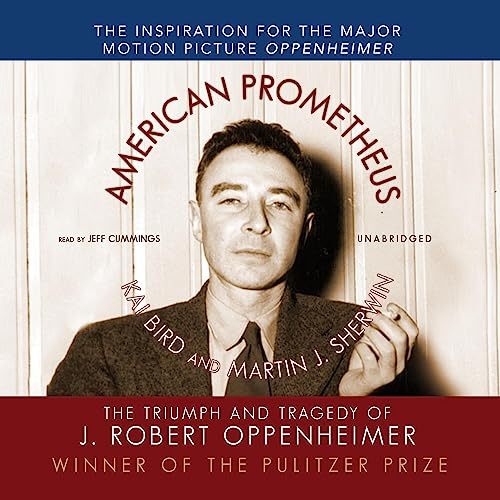
#American Prometheus: The Triumph and Tragedy of J. Robert Oppenheimer#oppenheimer#robert oppenheimer#martin j. sherwin#kai bird
7 notes
·
View notes
Text
Nuevo tráiler de 'Oppenheimer' revela a Albert Einstein, Florence Pugh, Robert Downey Jr. y más en la película repleta de estrellas de Christopher Nolan....

View On WordPress
#ALDEN EHRENREICH#Alex Wolff#American Prometheus: The Triumph and Tragedy of J. Robert Oppenheimer#Benny Safdie#Christopher Nolan#CILLIAN MURPHY#Cine#Dane DeHaan#David Dastmalchian#EMILY BLUNT#Florence Pugh#GARY OLDMAN#IMAX de 70 mm#Jack Quaid#James D&039;Arcy#Jason Clarke#Josh Peck#KENNETH BRANAGH#Leslie Groves Jr.#Ludwig Göransson#Matt Damon#Matthew Modine#Oppenheimer#Proximos Estrenos#RAMI MALEK#Robert Downey Jr.#Tom Conti#UNIVERSAL PICTURES
0 notes
Text
Oppenheimer - Movie Review
Epic-maker movie “Oppenheimer”, directed by Christopher Nolan tells the story leading up to atom bombs dropped on Hiroshima and Nagasaki towards the end of World War II that changed the course of history forever. The film is based on the Pulitzer Prize-winning book “American Prometheus: The Triumph and Tragedy of J. Robert Oppenheimer” by Kai Bird and Martin J. Sherwin.
Deeply heartrending…

View On WordPress
#atom bombs#“American Prometheus: The Triumph and Tragedy of J. Robert Oppenheimer”#“Oppenheimer”#“quantum mechanics”#Christopher Nolan#Cillian Murphy#cyclotron#Dylan Arnold#Earnest Lawrence#Emily Blunt#Epic-maker#Hiroshima#Josh Hartnett#Kai Bird#Leo Szilard#Lewis Strauss#Lt. Gen Leslie Groves Jr.#Manhattan Project#Martin J. Sherwin#Matt Damon#McCarthy era#McCarthyism#movie#Nagasaki World War II#Pulitzer Prize-winning#Robert Downey Jr.#Werner Heisenberg
4 notes
·
View notes
Text
By Susan Montoya Bryan
LOS ALAMOS, N.M. — The movie about a man who changed the course of the world’s history by shepherding the development of the first atomic bomb is expected to be a blockbuster, dramatic and full of suspense.
On the sidelines will be a community downwind from the testing site in the southern New Mexico desert, the impacts of which the U.S. government never has fully acknowledged. The movie on the life of scientist J. Robert Oppenheimer and the top-secret work of the Manhattan Project sheds no light on those residents’ pain.
“They’ll never reflect on the fact that New Mexicans gave their lives. They did the dirtiest of jobs. They invaded our lives and our lands and then they left,” Tina Cordova, a cancer survivor and founder of a group of New Mexico downwinders, said of the scientists and military officials who established a secret city in Los Alamos during the 1940s and tested their work at the Trinity Site some 200 miles away.
Cordova’s group, the Tularosa Basin Downwinders Consortium, has been working with the Union of Concerned Scientists and others for years to bring attention to what the Manhattan Project did to people in New Mexico.
While film critics celebrate “Oppenheimer” and officials in Los Alamos prepare for the spotlight to be on their town, downwinders remain frustrated with the U.S. government — and now movie producers — for not recognizing their plight.
Advocates held vigils Saturday on the 78th anniversary of the Trinity Test in New Mexico and in New York City, where director Christopher Nolan and others participated in a panel discussion following a special screening of the film.
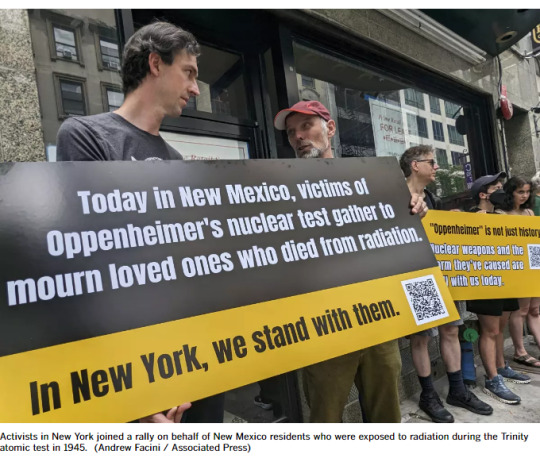
Nolan has called the Trinity Test an extraordinary moment in human history.
“I wanted to take the audience into that room and be there for when that button is pushed and really fully bring the audience to this moment in time,” he said in a clip being used by Universal Studios to promote the film.
The movie is based on Kai Bird and Martin J. Sherwin’s Pulitzer Prize-winning “American Prometheus: The Triumph and Tragedy of J. Robert Oppenheimer.” Nolan has said Oppenheimer’s story is both a dream and a nightmare.
Lilly Adams, a senior outreach coordinator with the Union of Concerned Scientists, participated in the New York vigil and said it was meant to show support for New Mexicans who have been affected.
“The human cost of Oppenheimer’s Trinity Test, and all nuclear weapons activities, is a crucial part of the conversation around U.S. nuclear legacy,” she said in an email. “We have to reckon with this human cost to fully understand Oppenheimer’s legacy and the harm caused by nuclear weapons.”
In developing and testing nuclear weapons, Adams said the U.S. government effectively “poisoned its own people, many of whom are still waiting for recognition and justice.”
Adams and others have said they hope that those involved in making “Oppenheimer” help raise awareness about the downwinders, who have not been added to the list of those covered by the federal government’s compensation program for people exposed to radiation.
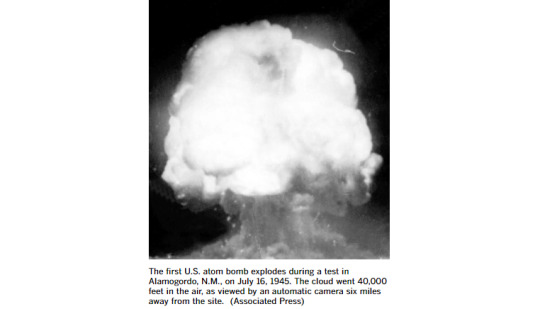
Government officials chose the Trinity Test Site because it was remote and flat, with predictable winds. Due to the secret nature of the project, residents in surrounding areas were not warned.
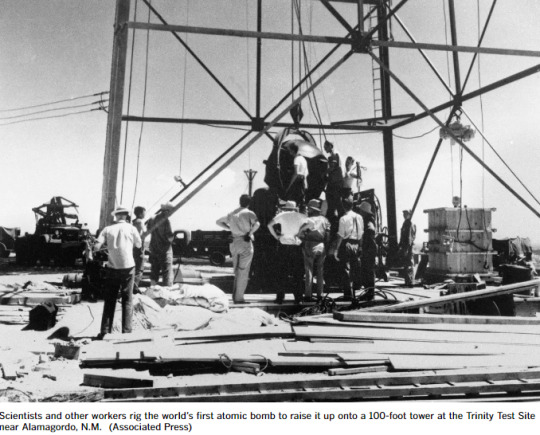
The Tularosa Basin was home to a rural population that lived off the land by raising livestock and tending to gardens and farms. They drew water from cisterns and holding ponds. They had no idea that the fine ash that settled on everything in the days following the explosion was from the world’s first atomic blast.
The government initially tried to hide it, saying that an explosion at a munitions dump caused the rumble and bright light, which could be seen more than 160 miles away.
It wasn’t until the U.S. dropped bombs on Japan weeks later that New Mexico residents realized what they had witnessed.
According to the Manhattan Project National Historical Park, large amounts of radiation shot up into the atmosphere and fallout descended over an area about 250 miles long and 200 miles (322 kilometers) wide. Scientists tracked part of the fallout pattern as far as the Atlantic Ocean, but the greatest concentration settled about 30 miles from the test site.
For Cordova and younger generations who are dealing with cancer, the lack of acknowledgment by the government and those involved with the film is inexcusable.
“We were left here to live with the consequences,” Cordova said. “And they’ll over-glorify the science and the scientists and make no mention of us. And you know what? Shame on them.”
29 notes
·
View notes
Text

(Right I think It's time for me to finally get this over with )
Helloo and Welcome to my Blog, This is Primarily a Writer/readerBlr, but there are other things too(Particularly listening to podcasts ) since I can't be bothered to make a side one.
My reader side - I am an avid reader and am almost always in the middle of a book, I will be updating here on which books I'm reading
Current read list -
Dracula (Bram Stoker)
The Screaming Staircase (Jonathan Stroud)
A Dance with the Fae Prince (Elise Kova)
American Prometheus: The Triumph and Tragedy of J. Robert Oppenheimer (Kai Bird)
The Silver Birds (Apolline Lucy)
That Night (Nidhi Upadhyay)
The Complete Adventures of Feluda, Vol 1 (Satyajit Ray)
The Da Vinci Code (Dan Brown)
The God of Small Things (Arundhati Roy)
The War of Lanka (Amish Tripathi)
City of Bones (Cassandra Clare) [@1indigoisles don't kill me]
And that's all I can remember Right about now , Yes I'm reading 10 books or more simultaneously, no I do not have an explanation to that.
My main Genre is Historical Fiction, Fantasy, Mystery and thriller, But I do love widening my scope so do recommend me any books you might think may pique my interest. 😁
My reader side also includes me obsessing over podcasts, I'm including my Favourite podcasts here too, and I assure you they are amazing!
Podcasts for you - I usually listen to them on Spotify and love True crime, mystery, Murder mysteries etc. Here they are -
Rotten Mango by Stephanie Soo (True Crime) - I wouldn't suggest you listen to this if you get disgusted or scared easily, I usually am not affected by these kinds of things and I was still very disturbed, The first 2 episodes are quite... I would suggest you research about it more before you listen to it.
Baking a Murder by Stephanie Soo (Books and movies) - This podcast is again one of my favourites, the way she explains the movie is just so immersive, if you want to understand a story but don't have time to sit down and read the book/watch the movie then this is for you.
7 Suspects by Cryptic Radio(Murder Mystery ) - OH MY GOD, holy- this is probably one of the best mystery podcasts I've ever listened to, tbh you think you know what is going on and till the very end that is kinda sorta true, but then in the like the last 5 moments the plot twist so intense you are left sinking on to the floor thinking "What just happened", listen to, right now.
Magnus Archives by Rusty Quill (Story? horror? not sure what it comes under) - I've started listening to it after getting intense FOMO and can confirm it's going pretty well, I mean I have a LOT to catch up to, but I can say, it's caught my interest.
Murder in HR by Caspian Studios (Murder Mystery) - Again OH MY GOD, again, this is one of the best mystery podcasts I've ever listened to, I mean yeah, the gym ad thingy gets a little bit annoying but the rest of the story compensates for it, again, you think you know where you are going, again up until the very end you just don't know what the hell is going on, and again (Do you see a pattern) when the mystery hits you you are flabbergasted, soo I suggest give it a listen(also kinda obsessed with the soundtrack).
Murphy's Inc. by 97toNow Productions (Scifi mystery) - This is one of the better ones, I'm still listening to it and it's just actually really good, It's kinda the thing you listen to once a day, kinda relaxing (for me at least )
Ok, so this one is a bit different, there is a podcast
Caso 63: Enigma: Spotify studios but it's in Spanish which I still haven't quite learnt and I didn't know this existed.
I was recommended 2063 theke Esechi by Spotify Studios which is in Bengali which I do, in fact, understand. It was voiced by one of my favourite actors and I was absolutely in love with it, It feels like I wasn't listening to a podcast but a movie and there is so much confusion and so many twists. This podcast has been made in other languages as well, the other two ik are Case 63 (In English) and Virus 2062(In Hindi). So check it out!!
Treat by C13Features (Horror, gory) - This is like a podcast movie, it's around 2 hours long maybe? this is pretty good I would say, you can give it a listen.
Welcome to Night Vale by Night Vale Presents (Absurdity?) - I really don't think I need to say anythi_-_- HAIL THE GLOWCLOUD.
Morning Cup of Murder by Morning Cup of Murder (True Crime) - True crime yk...
The Sounds of Nightmares by Little Nightmares - Bandai Namco Europe (Horror, gore, mystery) - Uhh it's a little unnerving how detailed the actions of characters are As if they were compensating for the fact that there are no visuals, but it was pretty good I would say(Also like the soundtrack)
My writer side- My most popularly known name is Jeah (jee - ah) and I'll be using that here, I am a new author getting started on writing. I still have a looong way to go but, I enjoy writing very much even though my mind and body are definitely not on par with my will to write which is why my second unintended hobby is procrastination. Most of the time that I'm here on Tumblr I am supposed to be doing some other work, like right now.
Anywaysss here are my current WIP's
Mirror My Way - This is my first and only properly published Book.
Tbh Not very proud of it, I did it in a hurry, because I took part in the school's Writing program, did nothing the whole year, and finished it in the last week, I honestly think It had potential but I kinda ruined it trying to finish it within the deadline. I wouldn't recommend you read it, It was supposed to be a part of a duology or trilogy but I think I'm just gonna let it sit in the corner for now, let it be there, think upon its mistakes, it did wrong 😤.
Tots and Coffee - Now this one I like better, this was actually inspired by the Scam Caller post here on Tumblr. Kinda had a sudden burst of inspiration and Wrote the first Chapter and since then it's still going pretty strong. Unlike the previous one, it is there on Ao3 if you wish to read it 😁.
I dunno what to call this but I occasionally write short stories in the replies of Pinterest pins when I come across writing prompts. This isn't a wip exactly but , I once posted the starting of a story and jokingly wrote "Continue-!" at the end thinking that would be the end of it, but someone did eventually continue it and that led to a string of events and a very weirdly Eledritch, beautiful Frankestine story formation, I'll be posting it slowly here on Tumblr as well, so keep checking!
Forgot to put it in earlier, but check out @the-writers-corner-inc
It's a group blog I initiated, and you can find lots of fun stories, prompts, visuals and more!!
And that's about it, I don't what else to say, but while you're here, grab a cup of coffee or tea, pick out a book and read a page, I'm right here on the other side with a book as well, let's be booky buddies 😄😄😃😃🍵☕
18 notes
·
View notes
Text


routesyxmedia OSCAR nominations are in and congratulations for Oppenheimer’s nominations for Best Adapted Screenplay written for the screen by Christopher Nolan & Sarai Briggs based on the books “American Prometheus: The Triumph and Tragedy of J. Robert Oppenheimer”..
Also nominated for Best Picture, Best Director, Best Actor, Best Supporting Actor and Actress, Adapted Screenplay, Production Design, Custome Design, Cinematography, Editing, Makeup & Hairstyling, Sound, etc.
10 notes
·
View notes
Text
best books I've read this year (so far) - all I rated 5 stars on goodreads/storygraph:
The Queen Is Dead by Stan Grant
Our Share of Night by Mariana Enriquez
I'm A Fan by Sheena Patel
Legends & Lattes by Travis Baldtree
American Prometheus: The Triumph and Tragedy of J. Robert Oppenheimer by Martin J. Sherwin, Kai Bird
Catwoman: Lonely City by Cliff Chiang
Kitchen Confidential: Adventures in the Culinary Underbelly by Anthony Bourdain

15 notes
·
View notes
Text
Candlestick of God
by Adam Kenichi Wekarski
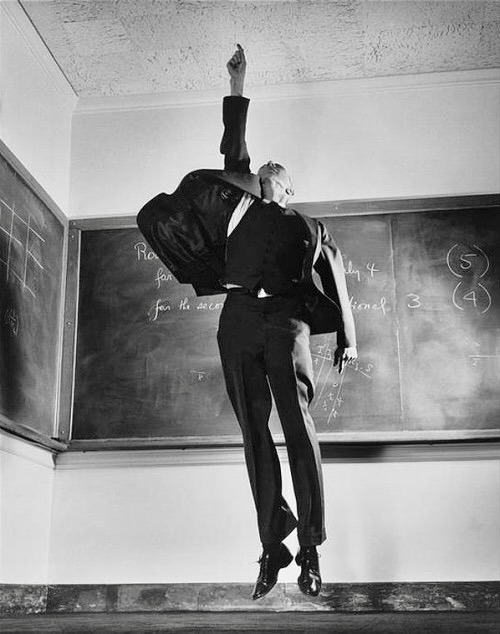
As one who has been completely fascinated by the actual reality of Nuclear Warfare (since my childhood), I have always found the creation of the Atomic Bomb to be the most important moment in all of human history (with exception of the actual beginning & origin of humanity & all of existence itself).
Christopher Nolan’s perfect film, “Oppenheimer”, is a significantly honorable & highly-sophisticated masterpiece that provides a cinematic insight into the individuals who were instrumental in the real life happenings of the theoretical design, creation, and eventual utilization of atomic power (as a means to an end) in one of the most defining moments in all of history.
Julius Robert Oppenheimer (portrayed Perfectly by Cillian Murphy in his finest performance) is the main focus of Nolan’s awe-inspiring cinematic achievement. Often considered to be “The Father of The Atomic Bomb”, J. Robert Oppenheimer (known commonly among his peers, family, and friends simply as, “Robert” and/or “Oppie”) was born in a Jewish household in New York City, New York, U.S.A. on April 22nd, 1904.
Born of a painter (Ella Oppenheimer/Mother) & textile importer (Julius Seligmann Oppenheimer/Father, respectively), J. Robert Oppenheimer is portrayed in the beginning of Nolan’s work as one who has an inherent appreciation for the beauty of artwork (in a somewhat subtle manner), showcased in a rather pensive moment in the beginning of the film (a moment slightly reminiscent of the end of the museum sequence in the American classic, “Ferris Bueller’s Day Off”; perhaps a deliberate cinematic nod). While the initial years of Oppenheimer’s life are not the main focus of this picture (Written & Directed Perfectly by Christopher Nolan), the film itself is based off a biographical book entitled, “American Prometheus: The Triumph and Tragedy of J. Robert Oppenheimer” (a monumental literary undertaking in it’s own right; championed by Martin J. Sherwin & Kai Bird, respectively).
Although the book is based on Oppenheimer’s life’s work (among other things), the film is a three-hour-epic which tells a tale of various meanings:
Firstly, the life of J. Robert Oppenheimer, which picks up in this film at the time of his initial years of his scientific legacy, as a student at The University of Cambridge (in Cambridge, England). In his academic years, Oppenheimer was not regarded with favor on the behalf of his scientific community. He had humbling beginnings in the scientific field, regardless of his inherent genius (which he would continue to enthrall himself in his own time). A particularly disturbing, yet accurate, moment in the film occurs when Oppenheimer actually attempts to poison his own instructor due to his considerable dissatisfaction of his experiences at Cambridge (without spoiling the story, this obviously does not come to fruition).
What does come to fruition, however, is the continual movement of subatomic & atomic particles working within the inner-structure of the mind (and overall being) of one J. Robert Oppenheimer (while he continues his pursuit of higher learning & his genuine love for all things astrophysical & theoretical science). Christopher Nolan’s film has a perfect ability of providing a visual interpretation of various scientific theories (whether it be conceptual or experimental) all-the-while providing a visual display of the deeply conflicted characterization of Oppenheimer himself throughout the entirety of his journey (via Murphy’s award-worthy performance). The cinematography of the film Oppenheimer is absolutely perfect (showcasing the undeniable superiority of film versus digital photography). The beauty of the picture is matched by moments of visceral intimacy (going in and out of focus at times with confidence) as well as larger-than-life & monumentally jaw-dropping imagery (especially during “The Trinity Test”). The musical score composed by Ludwig Göransson is a true work of genius as it creates an experimental (and highly profound & meaningful) atmosphere that helps shape the cinematic world within the film “Oppenheimer.” Göransson’s score is a refreshingly beautiful balance of symphonic & orchestral instrumentation while incorporating a tasteful implementation of electronic & synthetic instrumentation to balance the overall structure of the film. As Oppenheimer’s innermost thoughts & flashes of brilliance are scattered across the picture throughout the entirety of the story (with visual flair & editing mystique in a nonlinear method, indicative of Nolan’s directorial style), the musical score accommodates the plot & picture perfectly with a sincerely divine grace & power.
While speaking on power, the notion of atomic & nuclear power is the driving undercurrent of the film’s main protagonist as the story unfolds. As the theoretical possibilities are literally astronomical within the understanding of Oppenheimer’s significantly educated mind (as he displays a fascination for existence at cosmological proportions) - the threat of nuclear weapons being constructed and crafted by the dark forces of Fascism (by Hitler & The Nazis) halfway across the world is the other driving undercurrent of the film’s plot and main characters (all of whom, in real life, did actually place their lives on the line for the sake of our world). The known reality that the Nazis of Germany & Austria (of old) had already devised their own plan to have the ultimate weapon to command their own will over the will of others (as their invasion of Poland was merely a first step in their agenda) was not far from Oppenheimer’s mind as well as the many key individuals of whom had not only shared time with him in his life, but had become spiritual warriors of the cause to stop (once and for all) the unGodly atrocities birthed from the minds of actual evil in Nazi-era Germany.
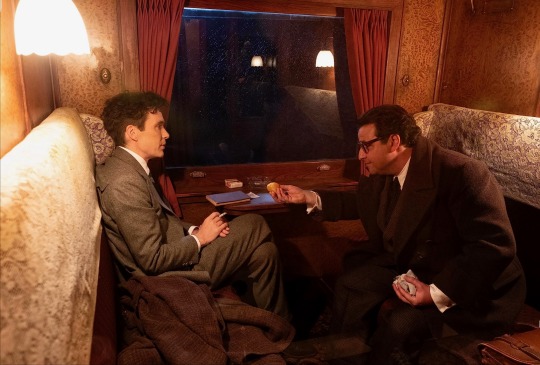
Key individuals had indeed entered Oppenheimer’s life; individuals like Isidor Rabi (portrayed gracefully by David Krumholtz in his finest performance on screen to date), Ernest Lawrence (portrayed very impressively by Josh Hartnett in his finest performance yet), Lewis Strauss (portrayed masterfully by one Robert Downey, Jr. in his greatest performance since “Chaplin”), Jean Tatlock (portrayed strongly by Florence Pugh in a highly provocative & deeply off-putting performance), Leslie Groves (portrayed incredibly by Matt Damon in my favorite on-screen performance by him since “Good Will Hunting”), Katherine “Kitty” Harris (who would later become Katherine “Kitty” Oppenheimer in real life and in the film; portrayed Perfectly by Emily Blunt in one of my favorite performances in the entire film), as well as many, many other key individuals who played significant roles in the organization of the atomic bomb in order to end what had become known worldwide as “The Axis of Evil” in [accurate] historical documentation.
The countless individuals who shall remain in the history books as having been directly associated with the formation of the U.S. Military effort (not to mention Canada and The United Kingdom, respectively) to create the Atomic Bomb are represented with dignified refinement in Christopher Nolan’s masterwork, “Oppenheimer.” The ensemble cast is enormous, and no one single performance can be understated by any other performance. Every performer on camera honorably captures an accurate portrayal of the manner of which these real life individuals had lived (granted with a dramatic tone mostly reminiscent in any major motion picture’s cinematic retelling of any major historical world event to connect an overall thought to anyone of whom views the picture).
In addition to the enormous ensemble cast is the enormous production design of the film. It’s particularly astounding to observe how Oppenheimer had become involved in the most important government protocol known to modern society, and then had the most important responsibility of practically producing a space within the nation to run highly-classified government operatives & lead numerous scientists (of both men and women) to create something that had never been physically manifested before by anyone. Cillian Murphy’s charming on-screen dynamics with his peers & colleagues (even among some of the most fascinating & completely serious situations; i.e. The personal politics becoming an element of interference & conflict even among the very people who worked as a team to construct the nuclear solution to the atomic problem; the complete classification of his work due to the priority of the U.S. Military; the priority of national security; his overall personal relationships while putting a new team of scientists together to perform the most massive scientific undertaking in a race against evil) - is just as organic as it is compelling to observe on film.
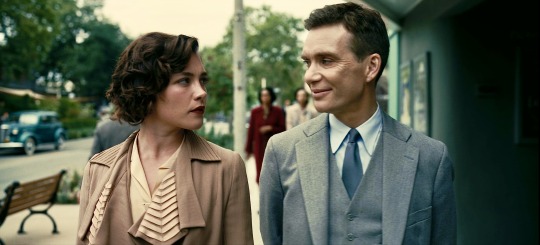
The reality of Oppenheimer’s associations with the Communist Party (as well as his own family members and friends) are presented very clearly throughout the entire film. Regardless of the numerous verbal warnings from fellow scientists such as Ernest Lawrence to keep politics outside of the laboratory (due to Oppenheimer’s rather open and highly vocal political opinions in favor for the Communist ideals with an intensely pro-worker stance), Oppenheimer continued to struggle to find the balance between his own personal convictions & morals as an individual as well as working within the functioning realm of national loyalty & honorable servitude. As the film continues into the development of Oppenheimer’s leadership as an instructor for his own students (which continues to increase in numbers), he eventually calls upon the brightest and most capable minds within his field to join the cause of stopping the world from being totally annihilated by the forces of darkness (as the Nazi army had continued to murder & genocide countless innocent lives in Europe on a daily basis and intended on dominating the world by total violence & mass genocide).
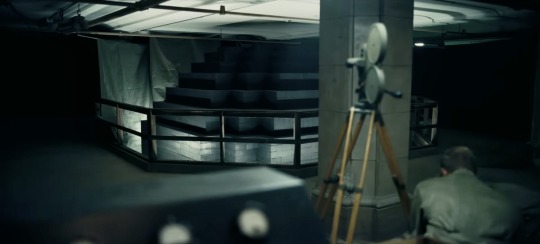
With a newly formed team and his continued work alongside Leslie Groves (a true man of the cause; a decorated Engineer of the U.S. Military who did his service to his country with much Pride & Honor) to build a physical location to perform what would later be referred to as “The Manhattan Project” (which was a perfect recreation in terms of production design of the classified military operation in Los Alamos, New Mexico, U.S.A.), Oppenheimer’s vision had come to fruition in the most tangible form (with the relentlessness of Groves throughout the entirety of the nuclear arms race). After the painstaking search for the perfect team to create the most destructive force known to humankind was completed (even with a briefly elusive encounter between Oppenheimer & Albert Einstein [portrayed by Tom Conti with awe-inspiring perfection & grace] in the beginning of the film when Strauss extends an invitation to Oppenheimer), the increase of scientific gravitas becomes ever more present with each scene in the film and each additional scientist of whom helps construct “the weapon to end all wars.” With each additional individual who presents more & more ideas to the table (so-to-speak) on how to successfully achieve the most effective scientific results (during an intimate look inside the American think-tank that constructed the weaponization of atomic power), the collaborative efforts put forth by the men and women who built the atomic bomb was frequently rife with conflict & tremendous disagreement due to the meeting of massive minds (often harboring massive ideas & massive egos to boot).
The potential security threat that Oppenheimer’s Communist ties initially raised had been dissolved by Leslie Groves due to his concrete belief in Oppenheimer’s intellectual abilities as a Scientist. This clear confidence, regardless of personal reservations, is what prompts Robert Oppenheimer’s brother, Frank Oppenheimer (portrayed respectably by Dylan Arnold) to join the highly classified government operation to defeat the Nazis in the race for atomic power (regardless of his clear ties with the Communist Party). The cause had become greater than us all as our personal politics and personal reservations regarding who did [or did not] pose a potential security threat to our nation had been placed as a postponed priority during a race against time (and an actual race against evil). Just as it has always been (in regards to the most important moments in human history), desperate times called for desperate measures. This is the compelling beauty of the unified cooperation & sincere teamwork that had actually happened in real life with real human beings who truly did save the world from the further influence of the destructive forces of darkness (and our absolute end as an overall existence). Regardless of differing political ideologies, many individuals came together for the common cause to stop the world from succumbing to the most sinister darkness ever known to be (by collectively constructing a proverbial candlestick of God to bring forth from the heavens the ultimate force of light).
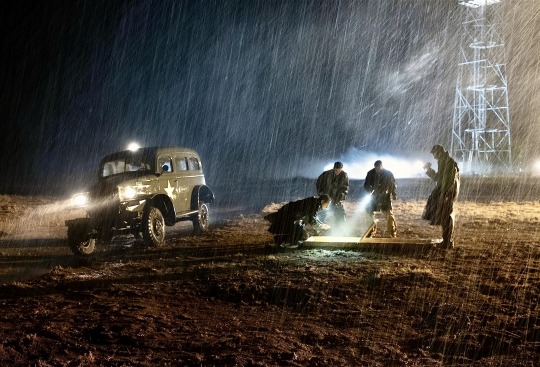
Secondly, “Oppenheimer” is a picture about the tragic betrayal & political persecution of J. Robert Oppenheimer despite his awe-inspiring commitment & loyalty to The United States of America as a government and as a nation (as well as the entirety of humanity and existence on Earth). The second act of this three-act work of art is primarily focused around the McCarthy-era “Red Scare” that occurred in America that followed the aftermath of the end of World War II in the following decade. The Red Scare had essentially been a witch-hunt in contemporary America for anyone who was a Communist, held affiliations with the Communist Party, or was suspected of having potential connections and/or ties with any individual(s) or organization(s) associated or in some way, shape, or form, and/or of having any relations with Communism as a whole (very reminiscent of another important socio-political picture focused on the era of McCarthyism in America entitled, “Good Night and Good Luck”).
Regardless of Oppenheimer’s complete commitment & sincere dedication to the cause of our great nation, he was still held under a severe amount of scrutiny and political punishment for his past associations with the Communist Party. In addition to a public hearing which had placed his entire scientific credibility & honor as a man under an unnecessary humiliation that attempted to destroy his life, family, and career - He also faced a significant amount of antagonistic questioning on a daily basis regarding a tapestry of arbitrary & meaningless questions that were implemented more severely & viciously with each passing day in order to further diminish, attack, and otherwise destroy his character (regardless of him & his family’s sacrifice for the greater good).
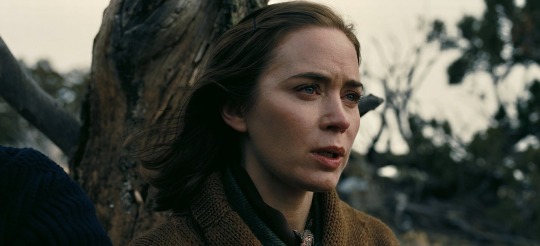
The second act is duplicitous in the sense that it’s nonlinear in it’s presentation (similar to the earlier work by Nolan, “Memento”). Act two is primarily in black & white, a clear indication of the nature of the duality of Oppenheimer’s scientific & humanitarian achievement in that he was once an exciting figure full of potential in the first act (with a sense of hope & color & adventure), and now the second act has him facing questions (in a stark contrast to act one) regarding his own character and his associations (in addition to the very achievement he was called upon in order to save the world from total annihilation, by the very people who asked for his help). The second act happens simultaneously with the first act which is a stroke of genius in the direction, writing, and overall production quality of the film. Without revealing too much in order to preserve the quality of the picture, the second act is a complete torment on Oppenheimer’s character and his actions and overall judgment calls (as the man responsible for having a scientific team working for the U.S. Military & U.S. Government that actually had Russian spies and double-agents infiltrating classified U.S. intelligence during The Manhattan Project and The Trinity Test). The truly unfortunate reality is that Oppenheimer, while being a genius who worked alongside many, many brilliant & wise individuals, still managed to succumb to the double-cross of individuals of whom were trusted with the highest security clearances in our own U.S. Government (while covertly operating within the means of international political subversion & government espionage).
While I will not indulge further into the premise regarding the socio-political plot-related themes of the film, I will indeed acknowledge the Kubrickian fashion in which Nolan has immersed his direction in this particular film (in all of it’s 70mm glory). Without spoiling the story for anyone; there is one scene during Oppenheimer’s questioning where the film provides a visual representation of how deeply each question had cut Oppenheimer as a person (and character). What would seem to be a completely gratuitous sex scene during Oppenheimer’s questioning (courtesy of Florence Pugh & Cillian Murphy, both in a highly artistic light), is actually an astonishing symbolic gesture that showcases the real suffering that was not only endured by Julius Oppenheimer (having been known for his illicit affairs), but also his wife, Katherine, during one of the worst times in Oppenheimer and his family’s life (which fed into Kitty’s alcoholism despite her own intellect & genius in real life). The questions of Oppenheimer’s commitment to our country, and to the greatest cause in the world, and the questioning of his personal affairs in order to smear his good name was discovered to be a deliberate method of private interest (facilitated by an individual later revealed in the film).
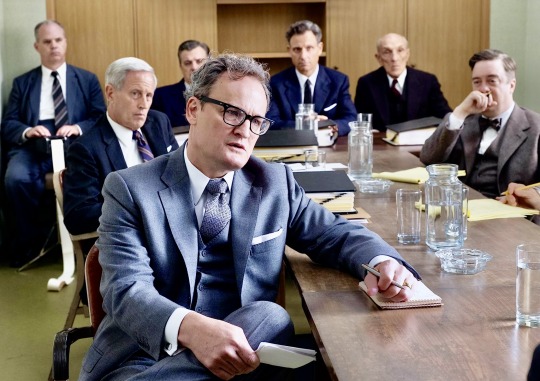
Oppenheimer’s credibility & worthiness had been completely tested, challenged, and disgraced regardless of the fact that he utilized his intellect (and the intellect of countless individuals in his immediate life that had all worked together) in order to bring an end to the forces of darkness by using the most powerful form of light: Atomic Power.
Thirdly, Christopher Nolan’s monumental cinematic achievement is, symbolically-speaking, about the Greek tragedy of the Titan known as Prometheus (originally based off of Hesiod’s ancient mythological poetry, “Theogony”; as well as the 5th Century [B.C.] epic trilogy written by Aeschylus, “Prometheia”; a trilogy of tragedy consisting of “Prōmetheús Desmótēs” (a.k.a. “Prometheus Bound”), “Promētheus Lyomenos” (a.k.a. “Prometheus Unbound”), and “Promētheús Pyrphóros” (a.k.a. “Prometheus The Bringer of Fire”). In the calculated words of Oppenheimer, himself, as he identifies with the paradigm of which confined Prometheus before him, “…I am become Death, the destroyer of worlds…” (taken from Eastern Philosophical Sanskrit spiritual text; quoting Vishnu of the Hindu faith; Bhagavad Gita, approximately 4th Century BCE). As Oppenheimer’s ability to “bring fire” to humanity (a cinematic similarity of the mythological tragedy of Prometheus), having stolen fire from Zeus and having given it to Humanity (in addition to civilization & science & knowledge from the heavens), the mythological being’s tale had become an obvious parallel to Oppenheimer in his actual waking life (when he was indeed alive on this earth and did aim to wield the power of the universal light). Regardless of Oppenheimer’s world-changing achievement (and the further harm it would prevent on a mass level), he was still able to intellectually determine his own profound understanding of the bloodshed & death that would be the result of his scientific creation (despite the necessity to stop the seemingly unstoppable armies of Germany & Japan at the time). Oppenheimer, like Prometheus before him, had successfully managed to reach for the stars and pull the light down from the heavens, and bring it to humanity on earth in order to prevent Zeus from completely obliterating and destroying humanity as a whole.

In Nolan’s masterpiece, as Prometheus had learned the ability to seize the power of fire could indeed be harnessed from the heavens, Oppenheimer had learned the ability to seize the atomic power that could actually be harnessed from existence itself (as the molecular structure of all existence as we know it is indeed a physical result of atomic activity combined with spiritual energy [individually & collectively]) within an interaction between the tangible & intangible forces of cosmic energy & matter & waves of sound.
As in the tale of Prometheus, after having brought fire to earth from the heavens, the following punishment was the eternal torture & torment of Prometheus (condemned by Zeus). Prometheus was shackled to a boulder, as his immortal liver was eaten on a daily basis (having the ability to regenerate each day) by an Eagle (typically identified as the emblem of Zeus). In a contemporary context, an eagle also identifies as a symbol of State Power; Authority of The State; Government Power. Zeus, in Nolan’s cinematic interpretation, has a much more fascinating and complex representation via two different major political figures (both Adolf Hitler as well as President Truman; the inherent duality of state power). Without giving anything away - The brief cameo of President Truman (as he and Oppenheimer meet) is an encounter similar to that of when Peter Finch’s ‘Howard Beale’ meets Ned Beatty’s ‘Arthur Jensen’ in the film “Network” (albeit more brief). While Oppenheimer’s brilliance and complete concern over the social responsibility of striving for a world where we no longer need to use any such weapons in order to remain a functioning society - President Truman (portrayed masterfully by an actor who shall remain nameless to maintain the integrity of the picture) shows the true nature of the political world by declaring the contrary and asserting a further implementation of research & development to deter any further international threats (regardless of Oppenheimer’s clear concern of any government having such access to such extensive means of weaponized methods of power on the nuclear level).
It’s a truly fascinating & monumental statement to have applied the cinematic telling of one of the most important moments in human history while simultaneously bringing forth poetic symbolism of a Greek tragedy (utilizing the most powerful form of cinematic triplicity; particularly with the utilization of Einstein who plays more like a force of nature rather than a man). The third act of the film releases Oppenheimer from his proverbial rock of eternal torment in his own modern Tartarus, as he is released by the help of the every-day scientist, David Hill (portrayed perfectly in a minor, but completely effective role by Rami Malek). As Heracles before him, Hill’s presence sheds new light on an intriguing internal development within the scientific community which not only shows the duplicitous nature of the second act, but also the duplicitous nature of the individuals of whom had called upon Oppenheimer to help create the atomic bombs that would be dropped on the civilian cities of Hiroshima & Nagasaki, Japan (respectively). Rami Malek’s brief, but significantly important role in the film is the pivotal turning point that grants Oppenheimer, his family, and his associations (both past and current) freedom from previous prejudice & extreme ridicule (in a gratifying on-screen showdown that brings forth the most important message of the entire film).
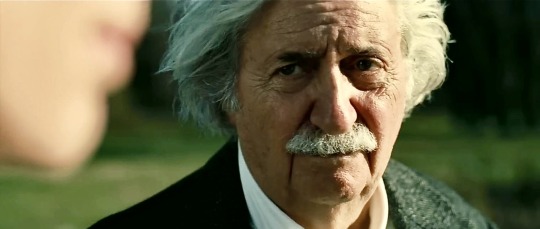
Lastly, and most importantly, the overall message of Nolan’s masterpiece is about honoring the people who deliberately rise to the occasion in order to save the good grace of humanity & the sanctity of life as we know it (regardless of prior or potential political affiliation or one’s professional ego or private interest). The importance of speaking up on the behalf of the ones who do good in the world, and celebrating each achievement in order to propel the individual (and the collective) further into the future is essential in all industries (not just the scientific field). The ones who literally step forward to save & preserve the fate of humankind & our world (by intellect, spirit, or body) should be awarded for their good faith (not punished or tortured or removed by exclusion due to the absurdity of bureaucracy or envious competitors or kicked back into the world merely as paupers, or as the film refers, a “Lowly shoe salesmen”).
In conclusion: The elusive moment between Einstein & Oppenheimer (which comes back around full circle from Act one through Act three) is a highly powerful moment on film that provides an insight into the purity of true genius & brilliance (more importantly & above all else: a wisdom that burns inside within the spirit of Oppenheimer as it had in Einstein; a candlestick of God’s light from within: All-Knowing, regardless of the tumultuous path ahead of the man that became known as “The Father of The Atomic Bomb”). The beauty of the film is not one individual’s achievement, but the collaborative achievement of the goodness of humanity as a species in order to stop the darkest evil known to humankind. It was one individual who lead a team of individuals (with unmeasurable personal & professional sacrifice on everyone’s behalf), a true human being alongside other noble human beings who did what was necessary to preserve the sanctity of life as we cherish it to be. Considering the known reality that the relevance of an actual threat of nuclear warfare still exists in our modern time (approximately one century after the real atomic bomb had been created by the most important team of individuals who placed, not only country above party, but humanity above it all), perhaps Christopher Nolan’s cinematic echo of the past will allow us all to consider the priority of humanity’s future as we look towards a better time, not just for a certain few, but for ALL of us as an entire world (now & forever).
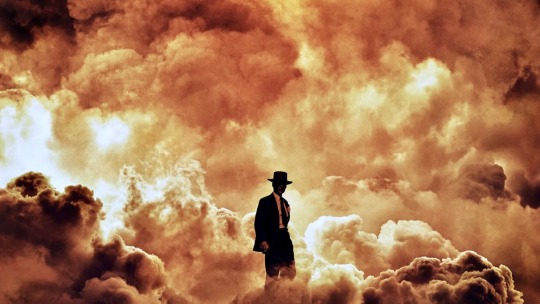
#Oppenheimer#CillianMurphy#EmilyBlunt#MattDamon#RobertDowneyJr.#FlorencePugh#DavidKrumholtz#JoshHartnett#MatthewModine#TomConti#LudwigGöransson#HoyteVanHotema#ChristopherNolan#EmmaThomas#JuliusRobertOppenheimer#HeinrichFriedrichFüger#Movies#Film#Art#CandlestickOfGod#AdamWekarski#AWESOME#TheMostImportantMovieOfALLTIME
14 notes
·
View notes
Note
Watched “Oppenheimer” last night, and I keep thinking about the scene with Gary Oldman as Truman. While I absolutely believe that Truman would have claimed all the credit & blame of dropping the bombs for himself, and also that Truman would have called Oppenheimer a cry baby and an s.o.b., I am struggling to think of Truman as being so naive that he thought that Russia would “never” develop their own bomb. I checked the reference — Ray Monk’s “Robert Oppenheimer” (2013) is the source for the scene, but I can’t get at his sources to see what he’s drawing from. McCullough’s “Truman” corroborates the cry baby comment and the blood-on-my-hands but not the “never” quote.
Do you have anything to hand about Truman’s belief in the Russian’s ability to build the bomb? How could anyone think that the Russians would “never” create a bomb?
In American Prometheus: The Triumph and Tragedy of J. Robert Oppenheimer (BOOK | KINDLE | AUDIO), which I believe was one of Christopher Nolan's major inspirations for the film, Kai Bird and Martin J. Sherwin go into detail about that meeting between Truman and Oppenheimer and the scene in the film takes almost word-for-word what is written in the book. Truman is actually quoted in the book as saying "Never" after asking Oppenheimer when he thought the Russians would develop their own atomic bomb and not getting a response.
The sources that Bird and Sherwin list for that meeting and the "Never" comment are Nuel Pharr Davis in the 1968 book Lawrence and Oppenheimer, and Murray Kempton, who wrote about the meeting and the comment in the December 1983 issue of Esquire Magazine and his book Rebellions, Perversities, and Main Events. I haven't read either of those books, but I did read Kempton's Esquire article and he also directly quotes Truman as saying "Never".
I agree that it seems really naive of President Truman to not think the Soviets would ever develop their own nuclear weapons. The only possible explanation that I can imagine for that mindset was that the meeting between Truman and Oppenheimer that is portrayed in the film took place in real-life on October 25, 1945. (In Kempton's Esquire article, he says it took place in 1946, but he was mistaken because Bird and Sherwin researched Truman's Presidential appointment calendar and were able to pinpoint the correct date.) The U.S. dropped the atomic bombs on Hiroshima and Nagasaki on August 6 and August 9, 1945, respectively. Japan surrendered on August 15 and the war officially ended when Japan signed the instrument of surrender on the USS Missouri on September 2, 1945. So, the meeting between Truman and Oppenheimer took place less than two months after the war finally ended. I can only imagine that Truman had still not fully shifted towards what the next conflict might be and was focused on trying to stabilize what was left of the world and mobilize the government in a different direction than it had been after 15 years of Depression, economic recovery, defense preparations, and fighting the war.
Plus, it's worth remembering that Truman didn't know anything about the existence of the American nuclear program until after President Roosevelt's sudden death thrust him into the White House and the military realized, "Oh shit, we should probably tell the new President that we're very close to building the most powerful weapon in the history of history!"
I don't think it was necessarily naivety on President Truman's part. I think, as Kempton suggests in the Esquire article, that is was just a fundamental lack of understanding by Truman that the Soviet Union didn't need Oppenheimer to build the bomb, especially since the war was now over and they wouldn't be under the time constraints or immediate pressures that made the work of the Manhattan Project so much more difficult. The knowledge was out there and the very fact that it had been proven by the Americans made it clear to the Russians and everyone else that it could be done. Harry S. Truman was a provincial politician from the outskirts of Kansas City who had a healthy dose of American Exceptionalism in him even before becoming a national figure, so the realities of nuclear physics were probably not easy for him to decipher.
#History#Oppenheimer#Atomic Bomb#Nuclear Weapons#Cold War#Harry S. Truman#President Truman#J. Robert Oppenheimer#American Prometheus#Kai Bird#Martin J. Sherwin#Murray Kempton#World War II#WWII
20 notes
·
View notes
Text
'Christopher Nolan is freaking me out.
“There’s a pretty simple argument mathematically for saying the world will end in nuclear Armageddon simply because that’s a possibility,” he’s calmly explaining. “Over an infinite timeline, it’s going to happen at some point.”
It’s hard to dispute Nolan’s logic that civilization will one day vaporize, but as he tops off his mug of Earl Grey tea from a small kettle on the table in front of him, he hits a slightly more hopeful note. “My optimistic human self has to believe we’ll find a way to avoid that, but I don’t take a lot of reassurance in the idea that mutually assured destruction has prevented a cataclysm so far. It’s the ‘so far’ that’s the problem.”
Nolan is something of an authority on the apocalypse. After all, “Oppenheimer,” his look at J. Robert Oppenheimer, the architect of the Atomic Age, is one of the most-seen films of this or any year. The three-hour, R-rated drama where the action mostly unfolds in laboratories and congressional hearings has grossed nearly $950 million globally, more than almost any recent Marvel movie. In the process, it’s reshaping Hollywood’s idea of what constitutes blockbuster entertainment.
Over the past two decades, comic book adventures subsumed the movie business, with studios churning out an assembly line of sequels and spinoffs featuring superpowered heroes. But “Oppenheimer” reveals that audiences will turn out in record numbers for darker, more complex stories. That is, if they’re told with the epic flair that Nolan has honed in movies like “The Dark Knight” and “Dunkirk.” And it’s giving other filmmakers hope.
“Not only did ‘Oppenheimer’ work, but it seemed to work in defiance of received wisdom,” says Damien Chazelle, the Oscar-winning director of “La La Land.” “Before I even saw the film, it felt like one of those test-case scenarios. All around the industry, a lot of people were saying, ‘This is not what the audience wants — it’s a bummer, and they just want escapism.’ And they were all wrong. So that makes its success all the sweeter.”
Nolan is stunned by the grosses, as well as the Oscar buzz that “Oppenheimer” is generating. “With certain films, your timing is just right in ways that you never could have predicted,” he says. “When you start making a film, you’re two or three years out from when it’s going to be released, so you’re trying to hit a moving target as far as the interest of the audience. But sometimes you catch a wave and the story you’re telling is one people are waiting for.”
In this case, the film reached screens at a moment of roiling global anxiety. Russia’s invasion of Ukraine, which took place just as Nolan and his cast and crew were starting production, has elevated fears of a potential nuclear conflict. And when we meet on an October morning in a lifeless conference room in lower Manhattan, blocks from where the World Trade Center once stood, we are a week away from the terrorist attack on Israel, which has resulted in unspeakable violence in the Middle East and the prospect of a widening war. Our troubled world has only grown more turbulent since “Oppenheimer” was released four months ago. (The film will be available on Blu-ray, DVD and digital on Nov. 21.)
“The awful truth of nuclear weapons is that concern about them ebbs and flows with the geopolitical situation,” Nolan says. “But it shouldn’t. The threat is always present, but sometimes an event will happen that brings it more front of mind. But that’s not how it should be; it’s a danger that hovers over the planet and will never go away.”
On the night “Oppenheimer” opened in July, Nolan sneaked his mom, his producing partner and (wife), Emma Thomas, along with three of their four kids into the back of the Imax theater at Manhattan’s AMC Lincoln Square to see how the sold-out crowd was enjoying the movie.
“I usually don’t want to go, but the minute I’m there, something magic happens,” says Thomas.
In the theater that night, as Oppenheimer and his team prepare to detonate the first nuclear weapon, Nolan felt viewers’ concentration intensify. “It was a remarkable experience to be there,” he says. “Every seat was filled, and the focus on what was happening on-screen was so strong. That level of engagement was something that I’d never really felt before. Real attention was being paid.”
On that morning downtown, Nolan, 53, is wearing a collared shirt, slacks and a blue blazer. He rarely deviates from this proper, vaguely professorial look, which colleagues say is intentional.
“His dressing style is a manifestation of the fact that he’s putting his energy elsewhere,” says “Oppenheimer” cinematographer Hoyte van Hoytema. ”He wears the uniform to make things easier for himself and to strip away the bullshit. He likes certain routines, and he hangs on to them in order not to have to think about anything else. He has such a hawk’s-eye focus on the task at hand. There’s no other director I’ve ever worked with who has such a specific devotion and dedication.”
There are certain rituals on a Nolan production too. He shoots on film, even though most of the industry has moved to digital, using Imax cameras to give his movies the scope and scale that he prefers. And he surrounds himself with a close-knit group of frequent collaborators — from Cillian Murphy, who took the lead role in “Oppenheimer” after five previous Nolan outings, to van Hoytema, who returned for a fourth go-round with the director. Despite his films’ big budgets, he likes to keep his sets small, shunning a video village. And he discourages his actors from spending a lot of time in their trailers.
“There’s not a lot of waiting around,” says Thomas, “because Chris is fast and efficient when he works.”
Thomas, who has produced all her husband’s films and co-founded their production company, Syncopy, says Nolan maintains an atmosphere on set. “Chris is clear about what he needs,” she says. “But there’s also a sense of calm, which allows people to do their best work.”
When he’s not shooting a movie, Nolan takes notes about ideas that, more often than not, never become a finished film. “His office is a shambles,” says Thomas. “It’s filled with notebooks. There’s no method to them — there are sketches of things or a logo for a movie he’s going to make or a little bit of a story he may want to tell. He writes everything down.”
But Nolan doesn’t start writing a script until he knows he’s actually going to make the movie he sees in his head. That’s partly due to his experience writing a biopic about Howard Hughes in the early aughts. He loved the screenplay he’d finished and expected to cast Jim Carrey as the reclusive billionaire, but he had to abandon it when a competing Hughes project, Martin Scorsese’s “The Aviator,” went into production. To this day, he hasn’t seen Scorsese’s film, something he had to confess to its star, Leonardo DiCaprio, when they made “Inception.”
“It was very emotional to not get to make something I’d poured all that into,” he says.
The idea for “Oppenheimer” was kindled when Robert Pattinson gave Nolan a book of the physicist’s speeches at the wrap party for his 2020 film “Tenet.” Nolan had been born into a world where nuclear weapons were a fact of life, but he was struck by how Oppenheimer and his fellow scientists were grappling for ways to make sense of the destructive power they had unleashed. “It was a brilliant mind asking how we manage this change we’ve wrought,” Nolan remembers.
That led him to revisit “American Prometheus: The Triumph and Tragedy of J. Robert Oppenheimer,” Kai Bird and Martin J. Sherwin’s Pulitzer Prize-winning biography. It documented how a socially awkward academic became the unlikely leader of America’s efforts to beat the Nazis in developing an atomic bomb. It also chronicled the aftermath of that discovery, as well as Oppenheimer’s conflicted feelings about the nuclear arms race it sparked. Nolan began to see the cinematic potential.
“This was a man who was a remarkable combination of integrity, sincerity and theatricality,” Nolan says. “I’m drawn to complex and contradictory protagonists.”
For most of his career Nolan made movies for Warner Bros. He never had a production deal with the studio, but Warners put him on the A-list by selecting him to oversee its “Batman” reboot, leading to the hugely successful “Dark Knight” trilogy. Warners then released other Nolan hits, such as “Dunkirk” and “Inception.” But in 2020, with the pandemic raging and theaters struggling to draw audiences, WarnerMedia chief Jason Kilar decided to premiere a year’s worth of films on HBO Max, the streaming service that Warner Bros.’ parent company had recently launched. Nolan didn’t have a movie slated to open during this period, but he was incensed by the precedent. He released a statement slamming the strategy as a bad business decision, writing, “Some of our industry’s biggest filmmakers and most important movie stars went to bed the night before thinking they were working for the greatest movie studio and woke up to find out they were working for the worst streaming service.”
So it wasn’t surprising that when it came time to make “Oppenheimer,” Nolan went elsewhere, to Universal. He had established a strong relationship with its head, Donna Langley, while working on a film adaptation of the TV series “The Prisoner” several years before. He couldn’t quite “crack” the adaptation, he says, which went unmade, but the pair stayed in touch, with Langley seeing Nolan and Thomas for the occasional lunch. Nolan appreciated Langley’s reputation for protecting and supporting top talent, while the executive was eager to land the next film from such a high-profile filmmaker. Still, “Oppenheimer,” with its nearly $100 million budget and lengthy discussions of theoretical physics, was a risky proposition.
“A biopic at this length about this subject matter should not do well,” says Langley. “But when you factor in a filmmaker like Chris, who is undeniably theatrical and who has a strong following of fans ranging from teenagers to adults, that’s the differentiator.”
Nolan didn’t want to make the movie on studio sets. He wanted to immerse viewers in the world of his protagonist, so he shot the film on location in New Mexico, near where Oppenheimer’s team made the bomb, as well as in Princeton and Berkeley, where he spent most of his academic career. The production also used historical locations, filming scenes in the actual Los Alamos home where Oppenheimer lived with his wife and young children as he oversaw the Manhattan Project.
“The audience may not notice the difference, but shooting as much as we can on the real locations gives everyone so much more to tap into,” says Thomas.
“Oppenheimer” unfolds in two overlapping sections. One, shot in color, is told from Oppenheimer’s perspective and is set largely during World War II. The other, produced in black and white, centers on Lewis Strauss, an original member of the U.S. Atomic Energy Commission, as he clashes with Oppenheimer over the scientist’s eventual opposition to the development of the hydrogen bomb. Strauss’ anger over slights, real and imagined, sets in motion a plot to discredit Oppenheimer and deny him his security clearance.
Nolan’s film depicts the Trinity test, the first detonation of the bomb in the New Mexico desert, in nail-biting detail, but it does not show the destruction of Hiroshima and Nagasaki, an omission that Spike Lee and others have criticized. Nolan says that was intentional — Oppenheimer was half a world away when the bombs were dropped. He learned about their detonation on the radio.
“The film presents Oppenheimer’s experience subjectively,” Nolan says. “It was always my intention to rigidly stick to that. Oppenheimer heard about the bombing at the same time that the rest of the world did. I wanted to show somebody who is starting to gain a clearer picture of the unintended consequences of his actions. It was as much about what I don’t show as what I show.”
Oppenheimer did grow more concerned about nuclear proliferation, and he advocated for the creation of an international body to control the production of radioactive material. However, he never publicly criticized the decision to drop the bombs. It’s a debate that continues to divide people. So what does Nolan think?
“My research and my engagement with this story tell me that anyone claiming a simple answer is in denial of a lot of the facts,” he says. “Obviously, it would be much better for the world if it hadn’t happened. But so much of the attitude toward the bombing depends on the situation of the individual answering the question. When you speak to people whose relatives were fighting in the Pacific, you get one answer. When you look at the devastating impact in Hiroshima and Nagasaki, you get another.”
Nolan says that he and the movie he made are more interested in provoking discussion than providing resolution. “The film is an honest attempt to express my feelings about it,” he says.
Shortly after Nolan and Langley announced in September 2021 that Universal would produce “Oppenheimer,” they revealed that the film would open two years later, in July, the same month that the director had launched two “Batman” movies, “Dunkirk” and “Inception.” “Chris is somebody who likes tradition,” Langley notes.
Nolan may have had sentimental reasons for picking July for “Oppenheimer” to drop, but he couldn’t foresee the stiff competition his film would face when it was released. In April 2022, Warner Bros. announced that it would open “Barbie” on the same day as “Oppenheimer.” It looked like the studio wanted to kill Nolan’s movie.
Nolan deflects when I ask him about it. “It’s always daunting when you start to see how the competition for the summer is shaking up,” he says. “I’ve been releasing summer films for 20 years, and it’s always crowded.”
If Warner Bros. intended to hobble Nolan’s film, the plan backfired spectacularly. Instead of cannibalizing each other, the prospect of two major movies opening in the same weekend galvanized audiences. It inspired memes that encouraged people to turn the confluence of blockbusters — one a neon-pink comedy, the other a somber drama — into an unlikely double feature.
“People had forgotten what it was like pre-COVID,” says Nolan. “Not that long ago, there often was more than one big film opening on a weekend. That can be stressful for filmmakers, but it’s better for theaters.”
It also seemed like a sign that audiences are desperate for something that isn’t a reboot or a retread. For the first time since 2001, the year’s three highest-grossing films, “Barbie,” “The Super Mario Bros. Movie” and “Oppenheimer,” aren’t sequels or comic book adventures.
“It’s clear from the box office that audiences are looking for things they haven’t seen before,” Nolan says. “We’ve been through a period where it was wonderfully reassuring for studio executives to feel that their franchise properties could go on forever and be predictably successful. But you can’t deny filmgoers’ desire for novelty.”
Despite the drama involving the “Barbie” and “Oppenheimer” release date, as well as his criticism of Warner Bros., Nolan’s relationship with the studio isn’t irretrievably broken. “It’s water under the bridge,” he says of the feud.
For one thing, the media chiefs that Nolan came out swinging against are gone. AT&T, which had prioritized streaming above all else, sold a controlling stake in the company to Discovery in 2022. The newly rechristened Warner Bros. Discovery then installed CEO David Zaslav, setting the stage for Kilar’s exit. Zaslav also recruited new movie chiefs, Michael De Luca and Pam Abdy. So is Nolan open to working with Warner Bros. again?
“Oh yeah, absolutely,” he says. “Pam and Mike and Zaslav, they’re trying to do some great things with that studio, which is encouraging to see.”
It also helps that the entertainment industry, and Warner Bros., have begun to share some of Nolan’s skepticism about streaming. For a time, nearly every major media company was busy dropping licensing deals that allowed their movies to appear on cable or platforms like Netflix. They wanted to bolster subscriptions to their own streaming services by offering their movies exclusively on the likes of HBO Max or Disney+. However, as Wall Street looked more closely at the economics of these platforms, it found them overly costly and insufficiently profitable.
Nolan, who clearly understands the film business as well as the art, says he slammed the HBO Max plan partly because of the shoddy economics. And he thinks that Hollywood’s decision to push a streaming model above all else caused the writers’ and actors’ unions to strike this year because they weren’t earning the same type of royalties they once did.
“Part of the craziness with the labor negotiations this summer has been the studios sitting there and going, ‘Well, we can’t pay you because we don’t have enough money,’” Nolan says. “To which the answer is ‘Well, you don’t have enough money because you’re not managing your business correctly. You’re not getting the same amount of money for your product that you were before.’ The shift to streaming has disrupted the entire industry and created problems for everybody.”
‘‘Are you making me look amazing?” Nolan asks.
He is in high spirits as he calls me a few days after our initial meeting to answer some follow-up questions and to see how the story is progressing. That includes teasing me when I ask him if he’s thought about what’s next after the blockbuster success] of “Oppenheimer.” “Why? Do you have a script to pitch me?” he asks with a laugh.
It’s a warmer, droller side of Nolan, and one I haven’t experienced before. Not that he’s prickly — he’s unfailingly polite, generous with his time and thoughtful in his responses. Yet, he’s also keenly aware of how his remarks may be misinterpreted on social media or repackaged online, which can lead him to approach certain topics gingerly. For example, when I ask him if he’s seen “The Batman,” Matt Reeves’ recent film about the Caped Crusader, Nolan says he doesn’t want to answer that question. “If I start talking about comic book movies, that would be the only thing anybody pays any attention to in the article,” he explains. He’s probably right.
Nolan hasn’t made up his mind about the kind of movie he’ll make next. And when I push him on whether he’d return to franchise filmmaking, as he did so effectively with his “Batman” films, or if he’d prefer to make a movie purely based on an original idea, he leaves the door ajar.
“Ideas come from everywhere,” he says. “I’ve done a remake, I’ve made adaptations from comic books and novels, and I’ve written original screenplays. I’m open to anything. But as a writer and director, whatever I do, I have to feel like I own it completely. I have to make it original to me: The initial seed of an idea may come from elsewhere, but it has to go through my fingers on a keyboard and come out through my eyes alone.”
It will be intriguing to see how Nolan spends the capital he’s accrued from the critical and commercial success of “Oppenheimer.” Ever since “The Dark Knight’’ topped the box office, studios have been lining up to work with him. He’s used their interest to greenlight cerebral epics and historical dramas that others might have had trouble getting made. These movies, whether they take place in the streets of Gotham City or on the beaches of France, center on similar themes. Many, if not most, of Nolan’s films contain a warning: The search for knowledge is perilous. That danger is front and center in “Oppenheimer,” where the quest to harness the power of the atom creates unimaginable suffering.
“This film has impacted people and made them think very deeply about all the ways in which we can be our own worst enemy,” says Thomas.
“Oppenheimer” also feels like the culmination of a phase of Nolan’s artistic journey.
“There was a sense that he’s been working his way toward this film,” Steven Soderbergh, the director of “Traffic” and an executive producer of Nolan’s film “Insomnia,” says. “It required all the tools and experience that he’d had up to that point to pull something like this off. This was the cinematic equivalent of a mic drop.”
Realizing his bold vision cost Nolan something. The darkness of the subject matter, along with the existential questions it raises, weighed on him as he edited the movie. One stormy day in Los Angeles, he was returning home when he noticed raindrops falling on a puddle. It evoked the beginning of “Oppenheimer,” where the intense physicist stares down at rainwater sloshing on the ground. It’s a moment of contemplation for a brilliant mind who, over the course of the film, will become painfully aware of humanity’s boundless potential to build, as well as destroy.
“As I looked at it, I had a distinctly negative reaction,” Nolan says. “That gave me the faith that the film was working on me. And it made me glad to leave it behind, which I haven’t felt with my other films. I was ready to think about other things.”
“So, thank you,” he says jokingly. “Thank you for dragging me back into this.”'
#Christopher Nolan#Oppenheimer#Cillian Murphy#Leonardo DiCaprio#Inception#Hoyte van Hoytema#Emma Thomas#Universal#Warner Bros#The Dark Knight#Dunkirk#American Prometheus: The Triumph and Tragedy of J. Robert Oppenheimer#Kai Bird#Martin J. Sherwin#Trinity test#IMAX
7 notes
·
View notes
Text
get to know the mun , repost don’t reblog !

what’s your phone wallpaper: my pups playing in the snow
last song you listened to: kollage by carly rae jepsen ( no forreal .. if u fuck with kali uchis listen to this song RIGHT now )
currently reading: love, theoretically by ali hazelwood , way of kings by brandon sanderson , & american prometheus : the triumph and tragedy of robert j. oppenheimer by kai bird & and martin sherwin
last movie: your name
last show: the simpsons . it was playing while i was eating something
craving: sesame balls from chinatown in nyc
what are you wearing right now: this oversized inuyasha shirt i slept in and some shorts
how tall are you?: 5'4"
piercings / tattoos ?: ears pierced and for tattoo an excerpt from the aeneid in latin over my left collarbone
glasses? contacts?: both , glasses atm
last thing you ate?: two eggs cooked in chili oil with rice and kimchi
favorite color(s): red but lately green lol
current obsession: ffxiv , trying out all the flavors of monster energy drinks
unrelated obsession: uh ... cid telamon and blade . give me a tall , hot , darked hair man with a deep voice and i'm a goner
any pets: two shiba inus , a cat , and recently a feral kitten whose trust i'm still earning
do you have a crush right now?: always . forever fictional :)
favorite fictional character: oh ... well ... a ton . i absolutely love addie larue , azriel , paul atreides , gojo satoru , manon blackbeak , casteel da'neer , shallan in way of kings (so far lol) , jude duarte , alys rivers , tifa lockhart , cidolfus telamon , and just a ton more i can't think of at the top of my head
last place you traveled: atlanta
tagged by: i stole it :)
tagging: steal it from me !
8 notes
·
View notes
Text
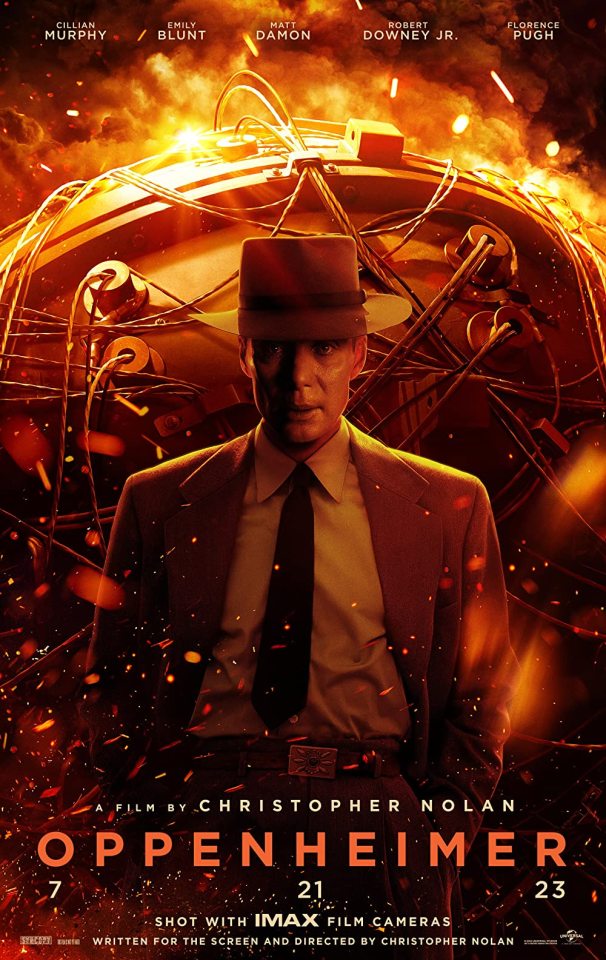
“I am, at the moment, stunned and emotionally recovering from having seen it,” Bird said. “I think it is going to be a stunning artistic achievement, and I have hopes it will actually stimulate a national, even global conversation about the issues that Oppenheimer was desperate to speak out about — about how to live in the atomic age, how to live with the bomb and about McCarthyism — what it means to be a patriot, and what is the role for a scientist in a society drenched with technology and science, to speak out about public issues.”
That's historian Kai Bird who co-wrote the Pulitzer-winning “American Prometheus: The Triumph and Tragedy of J. Robert Oppenheimer,” working alongside the late Martin J. Sherwin. The screenplay for Nolan’s film is adapted from the book, which serves as a biography of J. Robert Oppenheimer, the American physicist who led the Manhattan Project in the creation of the atomic bomb.
That's the whole article & you can watch the trailer for Christopher Nolan’s OPPENHEIMER, coming to theaters on July 21st, below.
youtube
#oppenheimer#christopher nolan#cillian murphy#coming soon to a theater near you#movie trailer#Youtube
13 notes
·
View notes
Text
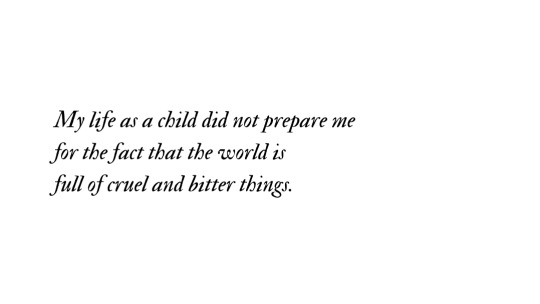
Robert Oppenheimer, American Prometheus: The Triumph and Tragedy of J. Robert Oppenheimer
7 notes
·
View notes
Text
Manhattan Project Book Recommendations
American Prometheus: The Triumph and Tragedy of J. Robert Oppenheimer by Kai Bird and Martin J. Sherwin

The First War of Physics: The Secret History of the Atom Bomb by Jim Baggot
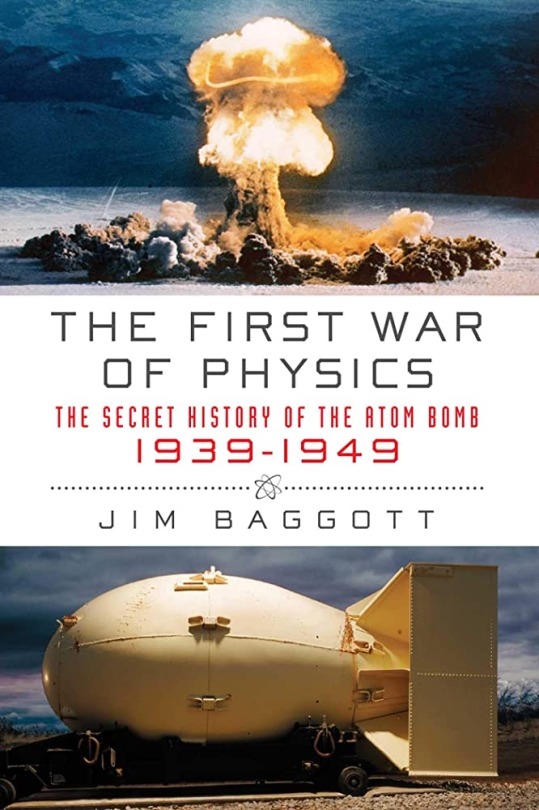
Dark Sun: The Making of the Hydrogen Bomb by Richard Rhobes

The Making of the Atomic Bomb by Richard Rhobes
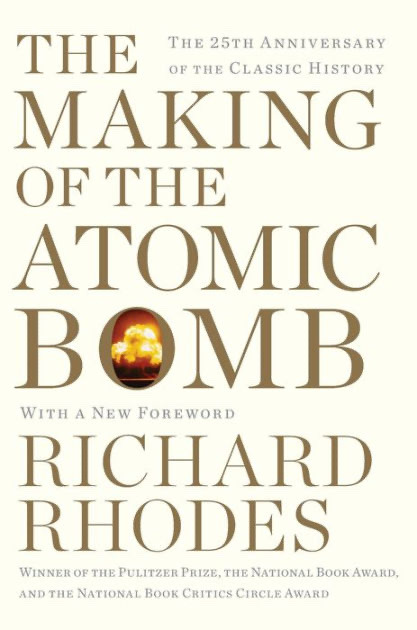
The Los Alamos Primer: The First Lectures on How to Build an Atomic Bomb by Robert Serber
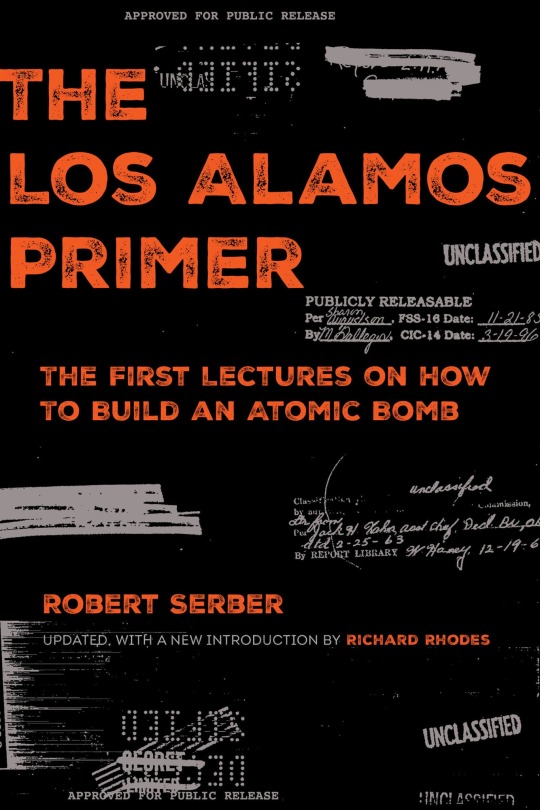
Now It Can Be Told: The Story of the Manhatten Project by Leslie R. Groves

The Bastard Brigade: The True Story of the Renegade Scientists and Spies Who Sabotaged the Nazi Atomic Bomb by Sam Kean

#manhattan project#oppenheimer#atomic physics#atom bomb#hydrogen bomb#wwii#oppenheimer movie#book recommendations#book recs
7 notes
·
View notes